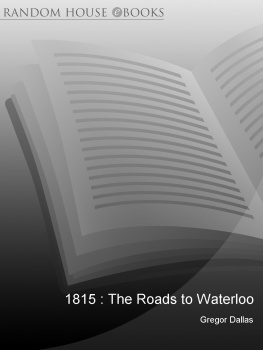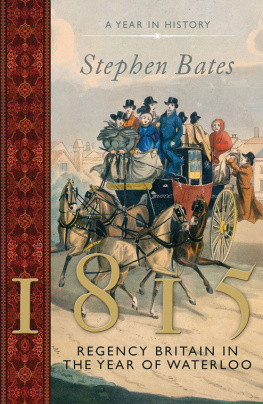PREFACE
The knowledge of Major Frye's manuscript and the privilege of publishing it for the first time I owe to the kindness of two French ladies, the Misses G. Their father, a well known artist and critic, used to spend the summer months at Saint Germain-en-Laye together with his wife, who was an English woman by birth. They had been for a long time intimately acquainted with Major Frye, who lived and ended his life in that quiet town. The Major's hostess, Mme. de W, after his death in 1858, brought the manuscript to Mrs. G and gave it to her in memory of her friend. It was duly preserved in the G family, but remained unnoticed. The Misses G rediscovered it in 1907, when it had been lying in a cupboard for upwards of half a century. On their showing it to me I thought it was interesting for many reasons, and worthy of introduction to the public. I hope the reader will share my opinion, which is also that of several English scholars and men of letters, to whom I communicated extracts from the manuscript.
The reminiscences are in the form of letters addressed to a correspondent who, however, is never named and of whose health, family and private circumstances not the slightest mention is to be found. So I am inclined to believe that he never existed, and that Major Frye chose to imitate President de Brosses and others who thus recorded their travelling experiences in epistolary form.
The manuscriptwhich will eventually be deposited in a public libraryis entirely in Major Frye's large and legible hand; at some later time it was evidently revised by himself, but many names which I have endeavoured to complete were left in blank or only indicated by initials. There are three folio volumes, bound in paper boards. In this edition it has been thought advisable to leave out a certain number of pages devoted to theatricals, of which Major Frye was a great votary, and also some lengthy descriptions of landscapes, museums and churches, the interest of which to modern readers does not correspond to the space occupied by them. For the information contained in the footnotes I am indebted to many correspondents, English, French, Swiss, Belgian and Italian, to whom I here express my hearty thanks. I am under special obligation to Sir Charles Dilke, Mr Oscar Browning, Professor Novati, Professor Corrado Ricci, Commandant Esprandieu, Professor Cumont, Professor Stilling and Mr Hchberg.
Major Frye's tombstone is in the cemetery of Saint Germain, and reads thus: "To the memory of Major William Edward Frye, who departed this life the 9th day of October, 1858." On the same stone has been added in French: "Perceval Edmond Litchfield, dcd le 15 Avril, 1888." About P.E. Litchfield I know nothing; he must have been the Major's intimate friend during the last period of his life.
* * * * *
W.E. Frye was born Oct. 29, 1784, and received his education at Eton (1797-9) in the time of the French Revolution. "The system was," he says, "to drill into the heads of the boys strong aristocratic principles and hatred of democracy and of the French in particular." The effect produced on the youth was the reverse of that intended. From 1799 to 1822 he belonged to the British army: here is an abstract of his services:
Ensign, 2nd Foot, 5th August, 1799.
Lieutenant, 2nd Foot, 7th March, 1800.
Half-pay, 4th Foot, 14th April, 1808.
Lieutenant, 24th Foot, 8th December, 1804.
Captain, 56th Foot, 18th April, 1805.
3rd Ceylon Regt., 15th Feb., 1810.
Half-pay, 3rd Foot, 7th March, 1816.
4th Foot, 24th Feb., 1820.
Brevet-Major, 12th August, 1819.
Sold out, 15th August, 1822.
In 1799, Frye took a part in the British Expedition to Holland. In 1801 he was in Egypt with Lord Abercrombie's army and received the medal for war service. His career in India lasted six years and gave him occasion to visit the three presidencies and Ceylon. In 1814 he returned on furlough to Europe and was in Brussels during the Waterloo campaign. The subsequent years1815 to 1819he employed visiting Western Europe, as appears from his reminiscences. I have read letters of his which prove that he lived in Paris from 1830 to 1832. Later, about 1848, he took an apartment in Saint Germain, and died there in 1858.
Major Frye was a very distinguished linguist; besides knowing Greek and Latin, he understood almost all European languages, and was capable of writing correctly in French, Italian and German. The Misses G have shown me a rare book published by him at Paris in 1844 under the following title:
"Trois chants de l'Edda. Vaftrudnismal, Thrymsquidal, Skirnisfor, traduits en vers franais, accompagns de notes explicatives des mythes et allgories, et suivis d'autres pomes par W.E. Frye, ancien major d'infanterie au service d'Angleterre, membre de l'Acadmie des Arcadiens de Rome. Se vend Paris, pour l'auteur, chez Heideloff & Cie, Libraires, 18 Rue des Filles St. Thomas. 1844" (In 8vo, xii, 115 pp.)
At the end of that volume are translations by Major Frye of several Northern poemsin German, Italian and English versefrom the Danish and the Swedish; then come two sonnets in French verse, the one in honour of Lafayette, the other about the Duke of Orlans, whose premature death he compares with that of the Northern hero of the Edda, Balder. A part of Frye's translation of the Edda, before appearing in book form, had been published in l'Echo de la Littrature et des Beaux Arts, a periodical edited by the Major's friend, M. de Belenet.
Frye loved poetry, though his ideas on the subject were rather those of the eighteenth century than our own. It is interesting to find an English officer reading Voltaire, Gessner, Ariosto, and quoting them from memory (which explains that some of his quotations had to be corrected). The sentimental vein of Rousseau's generation still flows and vibrates in him, as when he says that he has never been able to read the letters of Wolmar to St Preux in Rousseau's Nouvelle Hlose without shedding tears. German minor poetry, now quite forgotten, attracted him almost as much as the great pages of Schiller, Brger, and Goethe. The Misses G. possess a manuscript translation in three volumes, in the Major's own hand, of Wieland's Agathodemon done into English. This he evidently intended to publish, as he had written the title-page which is worded as follows:
"Agathodemon, a philosophical romance translated from the German of Wieland
by W.E. Frye, member of the Academy degli Arcadi in Rome, and of the Royal
Society of Northern Antiquarians of Copenhagen, ex-major of infantry in His
British Majesty's service."
Frye describes with accuracy, and shows much appreciation of fine scenery and architecture. His judgements in painting and sculpture are sincere, though often betraying the autodidact and amateur. He loved music, especially Rossini's operas which were then beginning their long career of triumph. Theatricals of all sorts, especially ballets, had a great attraction for him and elicited his enthusiastic comments. In comparing tragedies and comedies which he had seen performed in different countries, he gave repeated proofs of his knowledge and critical insight. We can take him as a good example of that intelligent class of English travellers whose intercourse with the Continental litterati





